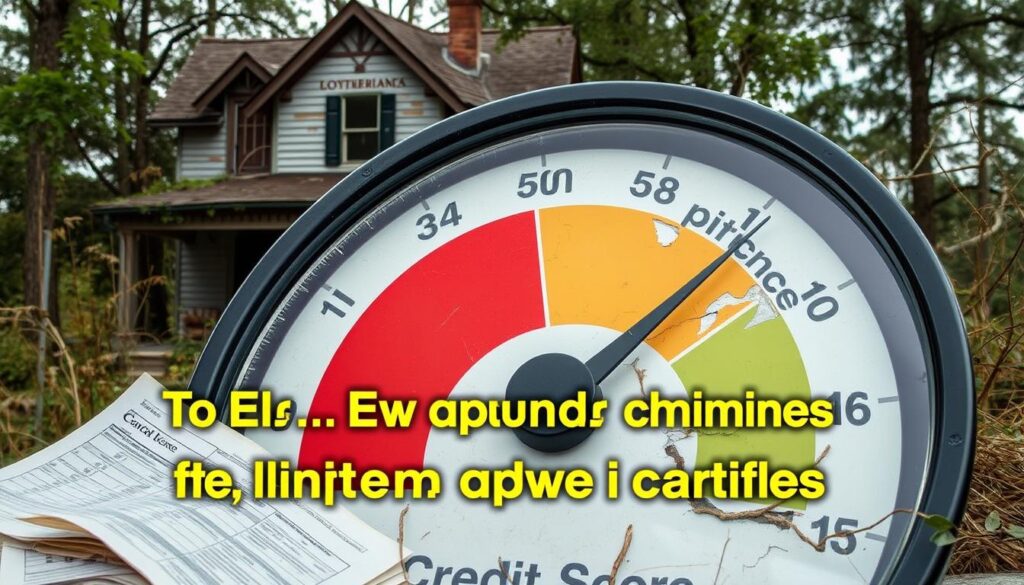Reverse mortgages, or Home Equity Conversion Mortgages (HECM), can be tricky to understand. Seniors with poor credit might worry about qualifying. But there’s good news! HECM loans are made to help older Americans, even those with hecm bad credit score.
Seniors with reverse mortgage with poor credit or reverse mortgage poor credit history may still be eligible. These loans offer financial flexibility for older homeowners. Don’t let bad credit stop you from exploring this option.
This guide will help you understand hecm with bad credit. We’ll look at eligibility requirements and ways to improve your credit. We’ll also explore other financing options for your golden years.
Key Takeaways
- HECM loans are available to seniors with bad credit, offering financial flexibility.
- Eligibility requirements for HECM loans may differ from traditional mortgages, providing opportunities for those with poor credit histories.
- Strategies to improve your credit score can enhance your chances of HECM approval.
- Alternative financing options may be available for seniors with limited credit history.
- Seeking professional guidance is crucial when navigating the HECM process with bad credit.
Understanding the HECM Reverse Mortgage
The Home Equity Conversion Mortgage (HECM) is a popular financial option for older homeowners. It allows them to access their home’s equity. Let’s explore what a HECM is and its hecm credit requirements.
What is a Home Equity Conversion Mortgage?
A HECM is a reverse mortgage for homeowners aged 62 and older. It converts part of their home’s equity into cash. This provides extra income during retirement, helping seniors with senior reverse mortgage bad credit.
Eligibility Requirements for HECM Loans
- Age: Borrowers must be at least 62 years of age.
- Home Ownership: Applicants must own their home outright or have a significant amount of equity built up.
- Credit Score: While hecm subprime credit or hecm low credit score may not disqualify borrowers, a strong credit history is preferred.
- Financial Assessment: Lenders will evaluate the borrower’s income, assets, and existing financial obligations to ensure they can meet the ongoing costs of the reverse mortgage.
Understanding HECM eligibility criteria helps seniors prepare for the application process. It allows them to explore ways to improve their financial standing. Even with less-than-perfect credit, seniors can consider HECM as a viable option.
The Impact of Bad Credit on HECM Approval
Securing a Home Equity Conversion Mortgage (HECM) can be tough with a hecm bad credit score. Lenders carefully check an applicant’s creditworthiness. A poor credit profile can make getting approved harder.
Lenders focus on the borrower’s credit history. Those with hecm with bad credit may struggle to meet eligibility requirements. Missed payments and high debt-to-income ratios can hurt approval chances.
A history of bankruptcy or foreclosure can also negatively impact HECM approval. Lenders prefer applicants with strong credit standing.
“Maintaining a good credit profile is essential when seeking a reverse mortgage, as it directly influences the lender’s willingness to approve the loan.”
However, reverse mortgage with poor credit doesn’t always mean automatic disqualification. Lenders may consider other factors like home equity and income.
They’ll also look at overall financial stability to determine loan feasibility. This gives hope to those with less-than-perfect credit.
- Borrowers with a hecm bad credit score may need to provide additional documentation or explanations to address their credit challenges.
- Lenders may also require a higher loan-to-value ratio or impose stricter repayment terms to mitigate the perceived risk.
- In some cases, borrowers may need to explore alternative financing options or work on improving their credit score before reapplying for a HECM.

Getting HECM approval with hecm with bad credit can be tricky. But with proper guidance and strategies, borrowers can overcome these challenges.
It’s possible to secure the financial benefits of a reverse mortgage, even with poor credit. Seek expert advice to navigate the process effectively.
Improving Your Credit Score for HECM Eligibility
Worried about your credit score for a HECM reverse mortgage? Don’t fret! You can boost your chances of approval. This guide will help you improve your credit rating and dispute errors.
Strategies to Boost Your Credit Rating
- Pay your bills on time: Payment history is crucial for your credit score. Always pay bills and credit card balances by the due date.
- Reduce credit card balances: Keep balances below 30% of your credit limit. This shows responsible reverse mortgage with poor credit management.
- Check your credit report for errors: Look for mistakes that could hurt your score. Review your report often and challenge any errors.
- Increase your credit limit: If you pay on time, ask for a higher credit limit. This can lower your credit use ratio and boost your score.
- Become an authorized user: Ask a trusted person with good credit to add you to their account. This can help your reverse mortgage poor credit history.
Disputing Errors on Your Credit Report
Credit report mistakes can block HECM approval. Here’s how to fix them:
- Get your credit report from Experian, Equifax, and TransUnion.
- Look for wrong info like accounts you don’t own or incorrect payment histories.
- Write to the credit bureaus about the errors. Include proof to support your claim.
- Follow up to make sure they’re investigating and fixing the issues quickly.
Taking these steps can boost your HECM approval chances. Even with a hecm with bad credit or hecm bad credit score, you can improve your outlook.
hecm with bad credit: Addressing Subprime Credit Situations
Getting a HECM loan can be tough with subprime credit. But don’t worry! There are ways to overcome this hurdle and secure financing. Strategies exist for those with hecm bad credit score or reverse mortgage with poor credit.
Consider the hecm bad credit allowed option. It offers an alternative for those with reverse mortgage poor credit history. This approach uses compensating factors to offset a low credit score.
Working with a reverse mortgage counselor can be crucial. They can help find creative solutions for home equity conversion mortgage bad credit situations. These experts guide borrowers through the process and provide valuable insights.
“With the right strategies and support, borrowers with subprime credit can navigate the HECM landscape and achieve their financial goals.”
A hecm with bad credit is challenging but not impossible. Focus on improving credit scores and addressing report errors. Leverage compensating factors to boost your chances of HECM approval.

Success in hecm with bad credit requires a proactive approach. Seek guidance from experienced professionals and stay persistent. With the right strategies, you can achieve your financial goals despite credit challenges.
Compensating Factors for HECM Approval
A less-than-perfect credit history doesn’t always mean rejection for a Home Equity Conversion Mortgage (HECM). Lenders may consider various factors that can positively impact the approval process. These factors can help even borrowers with hecm subprime credit or a hecm low credit score.
Demonstrating Financial Responsibility
Lenders look for evidence of your financial responsibility. This can include several key elements.
- A stable and reliable source of income, such as Social Security, pension, or retirement benefits.
- Significant assets, such as savings, investments, or the equity in your home, which can demonstrate your ability to meet the financial obligations of a hecm credit requirements.
- A history of timely payment on other financial obligations, even if your credit score is not optimal.
Showcasing your financial stability can offset concerns about your senior reverse mortgage bad credit. It can increase your chances of HECM approval.
“Lenders understand that credit scores don’t tell the whole story. If you can demonstrate your ability to manage your finances responsibly, they may be more willing to consider your HECM application, even with a hecm low credit score.”
Work closely with your reverse mortgage counselor and lender. Highlight the positive aspects of your financial profile. This can help offset any concerns about your credit history.
The Importance of Seeking Professional Guidance
Applying for a hecm with bad credit can be tricky. It’s even harder for those with credit issues. Professional help can make a big difference in getting approved.
Reverse mortgage counselors guide borrowers through the HECM program. They know how hecm bad credit score affects approval. These experts can suggest ways to tackle credit problems.
Financial advisors help with the money side of reverse mortgages. They look at long-term effects and other options. They can create a plan to keep the HECM loan stable.
“Seeking professional guidance is essential when considering a reverse mortgage, especially for those with a hecm bad credit score or reverse mortgage poor credit history. These experts can provide the necessary support and expertise to navigate the process successfully.”
Working with counselors and advisors helps borrowers understand the program better. They can address credit concerns and make smart choices. These experts align decisions with long-term money goals.

Getting a hecm with bad credit takes extra care. But with expert help, it’s possible. The reward is greater financial security.
Reverse Mortgage Counseling and Education
Professional guidance is vital when exploring a hecm with bad credit or a senior reverse mortgage bad credit. Reverse mortgage counseling offers crucial insights for hecm subprime credit and hecm low credit score scenarios. Understanding costs and responsibilities is key to making informed decisions.
Understanding the Costs and Responsibilities
Reverse mortgages, like the Home Equity Conversion Mortgage (HECM), are complex financial transactions. They have long-term effects on your finances and estate. Counseling sessions explain the true costs, including upfront fees and ongoing charges.
You’ll learn about your obligations as a borrower. These include maintaining the property and paying taxes and insurance. Understanding these aspects helps you prepare for potential challenges.
| Cost Considerations | Borrower Responsibilities |
|---|---|
|
|
Grasping these financial aspects is crucial for your long-term goals. It ensures you’re ready to face any challenges that may arise. Informed decisions align with your unique financial situation and future plans.
“Reverse mortgage counseling is essential for seniors, especially those with credit challenges, to fully comprehend the implications of this financial product and make the best decision for their unique circumstances.”
Exploring Alternative Financing Options
Seniors with bad credit have options beyond HECM loans. These alternatives can unlock home equity despite poor credit history. Let’s explore some viable solutions for those facing credit challenges.
Home Equity Loans and Lines of Credit
Home equity loans and HELOCs offer more flexible credit requirements. These products allow homeowners to access their home’s equity. However, they often require monthly payments, which may not suit all seniors’ financial situations.
Proprietary Reverse Mortgages
Proprietary reverse mortgages are non-government-insured products with lenient credit criteria. They can be accessible to those with poor credit history or a low credit score. Careful evaluation of terms and fees is crucial before choosing this option.
Refinancing with Cash-Out
Cash-out refinancing can provide needed funds while potentially improving overall financial situations. This approach may offer lower interest rates or better terms. It’s an option worth considering for homeowners with bad credit.
Weighing the pros and cons of each option is essential. Seek professional guidance to align your choice with long-term financial goals. The right solution can help you access home equity despite credit challenges.
| Financing Option | Pros | Cons |
|---|---|---|
| Home Equity Loan/HELOC |
|
|
| Proprietary Reverse Mortgage |
|
|
| Refinancing with Cash-Out |
|
|
Weighing the Pros and Cons of HECM with Bad Credit
A home equity conversion mortgage (HECM) with a bad credit score has its ups and downs. It can be a financial lifeline, but it’s vital to understand the long-term effects.
A HECM with bad credit lets you tap into your home’s equity without strict credit checks. This helps retirees or homeowners with past money troubles who have significant home equity.
It can boost income, cover medical bills, or fund retirement needs. But be aware, this option may have higher fees or less favorable terms.
The long-term financial impact needs careful thought. It can reduce your home’s equity and affect your estate planning.
To decide wisely, explore all options and get expert advice. A HECM counselor can explain the costs and responsibilities of reverse mortgages.
They can also suggest other financing solutions that might suit you better.
“Obtaining a HECM with bad credit can be a viable option, but it requires careful consideration and planning to ensure it aligns with your long-term financial goals.”
Your choice should be based on your money situation, personal goals, and risk comfort. Weigh the pros and cons carefully.
Seek professional advice to make a smart decision. This will help secure your financial future and overall well-being.
Success Stories: Overcoming Credit Challenges
A hecm with bad credit isn’t an insurmountable obstacle for securing a reverse mortgage. Many seniors have successfully navigated the HECM process despite having a reverse mortgage with poor credit. These inspiring stories show that financial setbacks don’t have to derail your plans.
Sarah, a 72-year-old retiree, faced financial difficulties earlier in life. She worked with a reverse mortgage counselor to improve her home equity conversion mortgage bad credit profile. This strategy helped her qualify for the loan she needed.
“I never thought I’d be able to access the equity in my home, but the reverse mortgage counselor helped me understand my options and put together a plan to get my finances in order. It’s been life-changing.”
John, an 80-year-old widower, struggled with medical bills and job loss. His credit history suffered as a result. A reverse mortgage specialist guided John to demonstrate his financial responsibility. This approach helped him secure the hecm with bad credit he needed.
- These stories show that overcoming credit challenges is possible with the right support. Professional guidance can help unlock the benefits of a hecm with bad credit.
- Understanding program requirements and exploring compensating factors are key steps. Leveraging expert advice can help seniors find financial security, even with a hecm bad credit score.
Approach the process with an open mind and willingness to address credit issues. Work closely with HECM professionals to navigate the program’s complexities. With the right strategies, a hecm with bad credit can become a reality.

Preparing for the HECM Application Process
Applying for a Home Equity Conversion Mortgage (HECM) can be challenging for seniors. This is especially true for those with hecm subprime credit or a low credit score. Proper preparation can boost your approval chances.
Documentation and Supporting Materials
To apply for a hecm credit requirements, you’ll need various documents. These show your financial status and eligibility. Gather these items before starting your application.
- Proof of age and identity, such as a driver’s license or birth certificate
- Proof of homeownership, including the deed and mortgage statements
- Information about your current income, including Social Security, pensions, and any other sources
- Details about your assets, such as bank statements, investment accounts, and retirement funds
- Your credit report and score, which will be used to assess your senior reverse mortgage bad credit situation
- Copies of any outstanding debts or financial obligations
Collecting these materials early can speed up your application. It helps ensure your hecm subprime credit or hecm low credit score doesn’t cause delays.
The key is showing financial responsibility despite credit issues. You can meet hecm credit requirements with the right approach. Proper preparation lets you confidently navigate the HECM application process.
Staying Informed: HECM Policy Updates
Staying updated on hecm with bad credit policy changes is vital. These changes can affect your eligibility for a reverse mortgage with poor credit. Understanding them helps you navigate the application process better.
The hecm bad credit allowed landscape is always changing. Keeping up with new developments can greatly impact your financial security. It ensures you make the most of your hecm with bad credit options.
- Regularly check the official hecm with bad credit website and industry publications for updates on policy changes.
- Attend hecm bad credit score educational workshops or webinars to learn about the latest regulations and best practices.
- Consult with a reverse mortgage with poor credit professional, such as a counselor or advisor, to stay informed on any reverse mortgage poor credit history changes that may affect your situation.
Being proactive about your hecm bad credit allowed knowledge is crucial. It helps you navigate the home equity conversion mortgage bad credit landscape confidently. This approach ensures you make the best decisions for your financial future.
“Staying informed about the latest hecm with bad credit policy changes is essential for seniors with a hecm bad credit score or reverse mortgage with poor credit history.”
Conclusion: Achieving Financial Security with HECM
The Home Equity Conversion Mortgage (HECM) program offers hope for seniors with bad credit. It provides a path to financial stability and independence. Despite initial hurdles, HECM can secure their financial future.
Seniors can unlock the benefits of this reverse mortgage option. They can access their home equity to supplement income or cover expenses. This can help fund retirement dreams, even with poor credit history.
The HECM isn’t a one-size-fits-all solution. It’s important to weigh the pros and cons carefully. Consider your unique financial situation before deciding.
With the right approach and support, seniors can achieve financial security. The HECM program can be a powerful tool for those with bad credit. Seek professional guidance to make the most of this opportunity.

